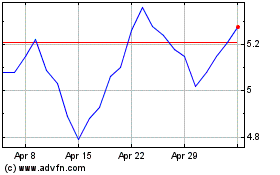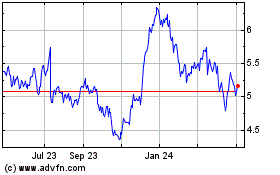By Drew Hinshaw
America's global campaign to prevent Huawei Technologies from
building the next generation of superfast internet has faltered on
the continent where Washington finds some of its closest allies:
Europe.
For months until the coronavirus pandemic, America's top
officials crisscrossed the continent, arguing that the Chinese
company is an espionage threat, subservient to its authoritarian
government. For Europe to transmit data on networks using Huawei 5G
equipment would offer Beijing an easy way to spy on the sensitive
information that will soon power automated factories, advanced
hospitals, self-driving cars and more, said U.S. officials.
The risks are considered so high that senior officials like
Secretary of State Mike Pompeo warned that the U.S. may roll back
its decades-old security and intelligence partnerships with allies
in the North Atlantic Treaty Organization who don't heed their
warning.
Huawei rejects the accusations and Chinese diplomacy has fought
back, with ambassadors threatening to curtail imports from
countries that ban the tech company. Chinese diplomats have spoken
about cutting back on German cars, or seafood fished from Denmark's
Faeroe Islands.
It all boils down to what European governments value more:
America's security umbrella or access to China's $12 trillion
economy.
So far, Europe has mostly chosen China, declining to follow the
U.S.'s hard-line position. Large powers and close allies like the
U.K. and Germany have balked, telling the Trump administration that
their own internal cybersecurity agencies can monitor Huawei
equipment and keep it secure. Telecommunications companies in small
countries, like Hungary, have already started rolling out 5G with
Huawei as a partner, shrugging off threats that the U.S. will
curtail defense cooperation if they proceed.
The U.S. threats have been counterproductive, says James
Sullivan, head of cyber research at the Royal United Services
Institute for Defence and Security Studies in London. "It's become
a sort of zero-sum game, and far too all-or-nothing," he says. "The
5G ship has sailed, nations have made their decision. It comes down
to how do you do risk management?"
Charges and denials
The contest over who builds the next layer of internet
infrastructure in Europe is a key battle in a broader conflict
between the U.S. and China, as Washington tries to maintain its
technological and security advantages over Beijing. The U.S. has
sought to contain China's advancing high-tech sector by restricting
exports of specialized products like microchips to China, while
blocking some tech firms from sharing sensitive kinds of advanced
research with Chinese companies.
American officials expect 5G internet will prove to be some of
the most critical infrastructure for the next major technological
breakthroughs. The network is expected to allow for advances like
automated factories, remote monitoring of medical patients and huge
leaps in artificial intelligence. Washington wants that information
channeled along networks owned by companies from allied, democratic
states.
The U.S. Justice Department has charged Huawei with racketeering
and stealing source code and other intellectual property from its
rivals. The department hasn't shied away from issuing strong
ultimatums to U.S. allies, whose trade and military secrets, it
warns, would be easier to steal over 5G networks.
"The concern still remains that if countries choose to go the
Huawei route, it could well jeopardize all the information sharing,
intelligence sharing that we've been talking about," U.S. Defense
Secretary Mark Esper said in February. "And that would undermine
the alliance."
The U.S. hasn't declassified any evidence concerning Huawei. The
company has repeatedly said it doesn't conduct espionage on behalf
of the Chinese state and that the U.S. is using cybersecurity
concerns as a pretense to contain a rival company. Huawei has often
been able to undercut competitors on pricing, thanks in part to
tens of billions of dollars in state financing.
"In the name of national security, the U.S. uses its power to
suppress and sanction Huawei," said China's ambassador to Hungary,
Duan Jielong, in a recent speech. "It's trying to force China to
swallow bitter fruit that would harm its sovereignty and security,
and China must fight back."
Huawei didn't respond to requests for comment for this
article.
The Russia factor
To be sure, European governments may still roll back Huawei
participation in their countries' networks, some analysts say. And
a couple of European Union countries that border Russia already
have backed Washington. Last year, Poland jailed a Huawei executive
on espionage charges, accusing him of crimes that the Polish
government says are too sensitive to detail publicly. Warsaw has
offered the U.S. assurances it will allow only a "trusted partner"
to construct 5G equipment. Estonia has made a similar pledge.
But those commitments have been largely motivated not by fears
of China, but of Russia, as governments look to curry favor with
the U.S., the only military power they view as capable of
effectively deterring Moscow.
Elsewhere on the continent, access to China's economy has
usually won out over American security concerns. Telecoms have
pressured their governments, arguing that Huawei's equipment is
significantly cheaper than that of its rivals Ericsson or Nokia,
and years ahead technologically. The coronavirus crisis has driven
down telecom profits, creating added pressure to go with the
cheapest supplier.
Small countries have sought to leapfrog larger economies by
rushing to roll out 5G, using Huawei equipment. And broadly,
leaders are wary of choosing sides in a costly U.S.-China
rivalry.
"The more the Trump administration asks for open-ended, 100%
statements saying 'We wont use Huawei,' the less it is likely to
get it, quite simply because this implies choosing sides," says
François Godement, senior adviser for Asia at the Institut
Montaigne, a nonprofit think tank in Paris that proposes
public-policy solutions to French agencies and businesses. "Deep
down, I don't think the U.S. can make Europeans move on the basis
of the threats....People very often shrug their shoulders and say,
'We don't know what they'll do, and they don't know what they'll
do, anyway.' "
Mr. Hinshaw is a Wall Street Journal reporter based in Warsaw.
He can be reached at drew.hinshaw@wsj.com.
(END) Dow Jones Newswires
April 09, 2020 15:44 ET (19:44 GMT)
Copyright (c) 2020 Dow Jones & Company, Inc.
Ericsson (NASDAQ:ERIC)
Historical Stock Chart
From Mar 2024 to Apr 2024

Ericsson (NASDAQ:ERIC)
Historical Stock Chart
From Apr 2023 to Apr 2024
